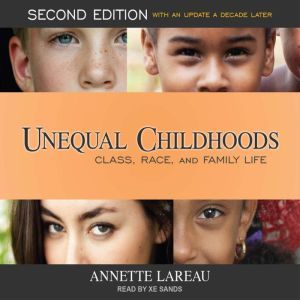

Unequal Childhoods
Class, Race, and Family Life, Second Edition, with an Update a Decade Later
Author: Annette Lareau
Narrator: Xe Sands
Unabridged: 14 hr 28 min
Format: Digital Audiobook Download
Publisher: Tantor Media
Published: 11/14/2011
Categories: Nonfiction, Social Science, Discrimination
Synopsis
The first edition of Unequal Childhoods was an instant classic, portraying in riveting detail the unexpected ways in which social class influences parenting in white and African-American families. A decade later, Annette Lareau has revisited the same families and interviewed the original subjects to examine the impact of social class in the transition to adulthood.


